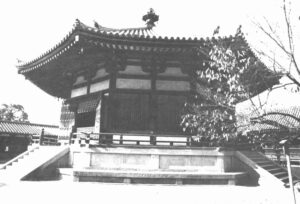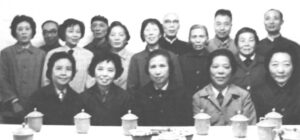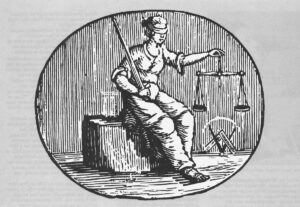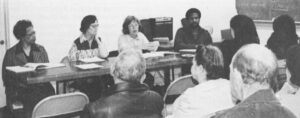Richard Denenberg
- 1980

Fellowship Title:
- Alternatives To Courts
Fellowship Year:
- 1980

Paying for Pollution: Environmental Mediation in Japan
TOKYO–There is a dark side to Japan’s glittering economic miracle. The brown cloud of photochemical smog that often hovers over Tokyo, the phosphate-choked waters of the Inland Sea and the dying cedars around the Tokugawa Shoguns’ shrine at Nikko are part of the price paid for more than two decades of headlong industrial growth. The Japanese have had their Love Canal disasters as early as twenty years ago and have opted for a form of social accounting which tallies a production cost that does not normally find its way into a businessman’s ledger column: the cost of pollution. The principle is that the victim is entitled to the compensation and that “the polluter pays.” The practice is often to determine the price of pollution, like wages, through a form of collective bargaining, presided over by the government’s Environmental Disputes Coordination Commission, a creative blend of conciliation agency and science court. The bargains are not always struck easily, nor quickly. But, while environmental mediation in the United States is still in its infancy, (*See “Bachman’s Warbler”

Peace on Dong Jiadu Street
SHANGHAI–Wang Chenwen is retired now. His closely cropped hair is stark white, and the smile that beams from behind the heavy eyeglasses furrows his face deeply. The few English phrases that have stayed in his memory were lodged there more than 40 years ago, when he worked for a wine merchant, one of the foreign businessmen who then dominated Shanghai’s brisk commerce. But, despite his years, if anything goes wrong on Dong Jiadu Street, in the city’s old section-if the neighbors began exchanging insults over a missing bicycle or blows over a leaky faucet-it is his responsibility. Mr. Wang is not a policeman, nor is he the venerated neighborhood sage. Keeping the peace is his job because the people on Dong Jiadu Street have made him the chairman of the Neighborhood Conciliation Committee, a unique organization-half official body, half volunteer activity-that helps ameliorate the tensions and frustrations of a society living at close quarters with itself. Mr. Wang has a good deal of help; three other men and five women, mainly retirees like him, act

Frontier Justice
(EDMONTON, ALBERTA) – From his sixteenth-floor office, Randall Ivany can look out over the rolling sweep of the Alberta prairie, punctuated by the silhouettes of wooden grain elevators and the stainless-steel gleam of oil refineries – the old and new sources of the province’s wealth. The commanding view inspires a sense of unbounded power, but, paradoxically, Randall Ivany’s job is to combat precisely that attitude among the officials who govern this prosperous western domain. He is there to ensure that they do not forget humility, fairness and what he likes to call “natural justice.” Ivany is the very model of the modern ombudsman, the arch-foe of overweening bureaucracy. He is the second incumbent of Alberta’s Office of the Ombudsman, a pioneering effort to transplant that Scandinavian invention to North America. The transplant has taken firm root. The office has functioned smoothly for more than 13 years, has answered thousands of citizen grievances and has become an exemplar for governments elsewhere. All but one of the nine other Canadian provinces have followed in Alberta’s footsteps, as

Bachman’s Warbler
Bachman’s Warbler (RED HOOK, N.Y.) –It might have become another snail darter case, the celebrated imbroglio between an obscure fish and a Tennessee dam. The endangered creature in this instance was an elusive South Carolina swamp bird whose buzzlike song is heard more often than its flitting yellow-and-green shape is seen. The threat to Bachman’s warbler was not a dam but a proposed logging operation that could have decimated its nesting ground in Francis Marion National Forest. The issue, however, was familiar: should the possible extinction of a rare form of life extinguish an economically important undertaking. In the snail darter controversy, the opponents managed to turn a dispute over a fish into legal bouillabaisse, the final serving dished up before the United States Supreme Court. The warbler dispute, in contrast, was settled simply and amicably, because the antagonists, the National Wildlife Federation and the U.S. Forest Service, hit upon an ingenious way around their impasse. They convened a triumvirate of respected biologists. Each side chose one member of the panel, and those two selected

Storefront Justice
(LOS ANGELES) — A pickup truck with a camper mounted on the back pulls up to a curtained storefront on Venice Boulevard. The driver and passenger, a couple in their twenties, enter an office furnished with three desks and a faded brown corduroy couch. A staff member welcomes them to the Neighborhood Justice Center, ushers them into a closet-like side room and introduces them to “your mediator, Sharon Shapiro.” They take seats around a small table, and the door closes. An hour and a half later the door opens, and out walks the mediator clutching a child support and visitation agreement signed by the couple and herself. It will take effect upon the couple’s imminent divorce. The husband and wife have just reaped the benefits of a grassroots movement toward lawyer-less, no frills conflict resolution. It is called community dispute settlement, or, as befits the Venice Boulevard operation, “storefront justice.” Propelled by the hefty price and meager satisfactions of conventional justice, the movement has been burgeoning. About 100 programs similar to the neighborhood center have
